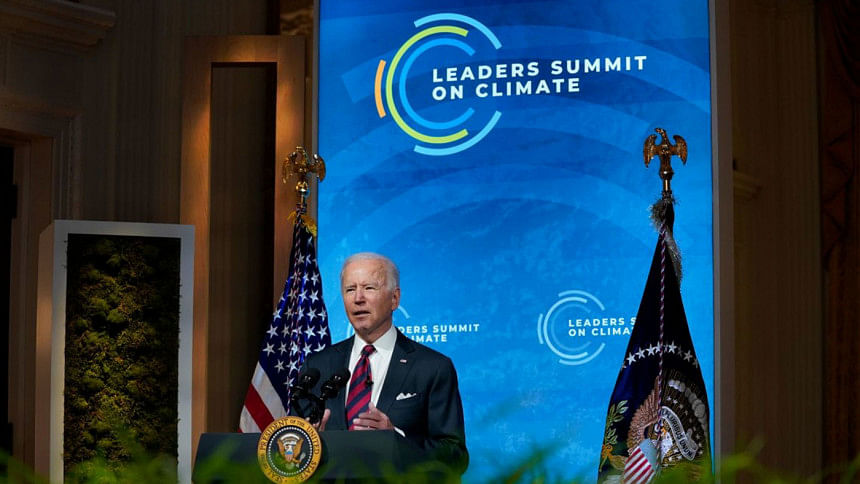Can Biden save our planet from overheating?

Every year, the Earth Day comes and goes while we continue to dig ourselves deeper and deeper toward climate and ecological disaster. Since the first Earth Day on April 22, 1970, we have pushed our planet to the brink of climate catastrophe, so much so that for those of us born in this century, every year has been warmer than the 20th-century average with last year rivalling the hottest year in modern times.
For the first time in recorded history, concentration of atmospheric carbon dioxide measured last month at the Mauna Loa Observatory in Hawaii was more than 420 parts per million. It is a disconcerting milestone, especially if we note that the planet has already warmed by more than one degree Celsius around halfway to doubling pre-industrial levels of carbon dioxide.
Then there is methane, a greenhouse gas that is a shape-shifter. The rapid rise of methane from an obscure trace gas to a major player in forcing climate change is often ignored by the policy makers, although global methane concentration in the atmosphere is now nearly two and a half times the pre-industrial levels of roughly 770 parts per billion. Methane may account for a minuscule portion of the greenhouse gases, yet it is extremely efficient at trapping heat from the Sun. Over a period of 20 years, it is 80-85 times more potent than carbon dioxide.
Armed with these alarming data, on this year's Earth Day, President Joseph Biden of the United States of America invited 40 world leaders, including Prime Minister Sheikh Hasina, for a two-day virtual summit to discuss plans on how to save humankind from the looming "existential threat" resulting from anthropogenic climate change. At the summit, he urged them to combat climate change collectively in order to prevent the planet from heading toward the climate tipping point—a critical threshold where a tiny change could push the climate system into a completely new, irreversible state. Some scientists believe that a "global disaster" is already unfolding because the climate may have crossed the tipping point.
Biden announced an ambitious plan to cut US greenhouse gas emissions to half their 2005 levels by 2030, reaching zero emissions no later than 2050. Although the proposed cut was part of the Nationally Determined Contribution under the 2015 Paris Climate Agreement, the White House did not provide a specific road map outlining what has to be done to implement the plan. Nevertheless, the target of 50 percent cut by the end of the decade will entail a steep and rapid decline of fossil fuel use in virtually every sector of the US economy. And that will require, among other things, producing electricity from renewable sources, cars and trucks running on electricity, phasing out chemicals used in refrigeration and air-conditioning that are thousands of times more potent than carbon dioxide at warming the planet, and using greenhouse gas removing technologies to suck carbon dioxide out of the air.
While a broad spectrum of people in the USA and elsewhere welcomed Biden's plan as an encouraging starting point, environmental activists argue that his aggressive goals to switch to clean energy by 2030 is "nowhere near enough" to keep our planet habitable. According to them, as the "biggest historical polluter," the USA needs to aim for at least a 70 percent reduction compared to 2005 levels—the high point for US emissions—if he wants to achieve zero emissions by 2050. More importantly, they are justifiably concerned that Washington's history of backing out of or failing to ratify climate commitments will jeopardise support for Biden's plan.
To the conservatives and anti-environmental groups, Biden's plan is a political hot air. They fear that if implemented, there will be massive destruction of wealth, surrender of America's international trade advantages, creation of a huge intrusive government-run bureaucracy, inhibition of free markets and a precipitous drop in the living standards of most Americans. A cadre of Republicans beholden to Donald Trump and the ultra-right Fox News even claimed, albeit falsely, that Biden will take hamburgers and steaks off the menu as part of his plan.
It is, therefore, an open question whether Biden's new policies will survive the American political system. In the past, policies on climate change have repeatedly shifted when Republicans were in power—first with George Bush undoing Bill Clinton's attempt to join the Kyoto Protocol, and then with Donald Trump pulling out of the Paris Climate Agreement negotiated by Barack Obama. Hence, for Biden's policies to succeed, he has to convince moderate Republicans to break ranks with their conservative colleagues who have succumbed to Trump's fallacious argument that climate change is a Chinese hoax. Biden's policies could also face obstacles in the courts.
Not only will Biden have to contend with congressional Republicans, he will also have to balance the demands of environmental groups that want him to go big on renewable energy while at the same time be wary of what it will mean for organised labour—in part because there are fewer union jobs in the renewable energy sector.
Biden's age is also a big factor. In the best-case scenario, setting an emissions target for the next ten years seems plausible if he remains president for two terms. In the worst-case scenario, 78-year-old Biden will in all likelihood be president for only one term. What if Trump or another Trump-like chump comes to power in 2024 and rolls back everything put in place by Biden? After all, the Republican-controlled Congress wiped out most of the Obama administration's environmental rules in the first 16 weeks of Trump's presidency.
Biden's plan overlooks an important aspect that plays, and will continue to play, a devastating role in heating up our planet. It totally ignores the fact that the heat-trapping gases presently in the air will not magically vanish even if we instantly stop adding greenhouse gases to the atmosphere. That is because different greenhouse gases take different amounts of time to break down via chemical reactions. Carbon dioxide has an atmospheric lifetime of hundreds to even thousands of years whereas nitrous oxide lingers for about 100 years. Methane dissipates relatively quickly, persisting for about 12 years. But there is a problem—a feedback-loop situation. When methane breaks down, it can turn into carbon dioxide, thereby replacing one greenhouse gas with another.
So, can Biden save our planet from overheating? Anyone hoping that Biden's plan will lead to a habitable future on this fragile planet should be circumspect because like most politicians, Biden is working with targets, not solutions. Moreover, he is trapped by the short-term self-interest of multi-national corporations and fossil fuel industries who fear that any real change will cut into their profit and power. Besides, his initiative of cutting greenhouse gas emissions without simultaneously removing the ones currently in the atmosphere will not be enough to stop the nightmarish effects of climate change.
Quamrul Haider is a Professor of Physics at Fordham University, New York.

 For all latest news, follow The Daily Star's Google News channel.
For all latest news, follow The Daily Star's Google News channel. 



Comments